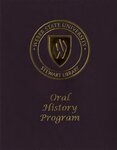| Title |
Korgenski, Marcy OH12_044 |
| Creator |
Weber State University, Stewart Library: Oral History Program |
| Contributors |
Korgenski, Marcy, Interviewee; Trentelman, Charles, Interviewer |
| Collection Name |
Business at the Crossroads-Ogden City Oral Histories |
| Description |
Business at the Crossroads - Ogden City is a project to collect oral histories related to changes in the ogden business district since World War II. From the 1870s to World War II, Ogden was a major railroad town, with nine rail systems. With both east-wast and north-south rail lines, business and commerical houses flourished as Ogden became a shipping and commerce hub. |
| Relation |
https://library.weber.edu/collections/oral_history |
| Biographical/Historical Note |
The following includes the transcript and a video clip from an oral history interview with Marcy Korgenski. |
| Subject |
Central business districts; Twenty-fifth Street (Ogden, Utah); Criminal justice, Administration of |
| Digital Publisher |
Stewart Library, Weber State University, Ogden, Utah, USA |
| Date |
2013 |
| Date Digital |
2018 |
| Temporal Coverage |
1965; 1966; 1967; 1968; 1969; 1970; 1971; 1972; 1973; 1974; 1975; 1976; 1977; 1978; 1979; 1980; 1981; 1982; 1983; 1984; 1985; 1986; 1987; 1988; 1989; 1990; 1991; 1992; 1993; 1994; 1995; 1996; 1997; 1998; 1999; 2000; 2001; 2002; 2003; 2004; 2005; 2006; 2007; 2008; 2009; 2010; 2011; 2012; 2013 |
| Item Size |
47p.; 29cm.; 2 bound transcripts; 4 file folders. 1 video disc: digital; 4 3/4 in. |
| Medium |
oral histories (literary genre) |
| Spatial Coverage |
Ogden, Weber County, Utah, United States, http://sws.geonames.org/11788968, 41.22809, -111.96766 |
| Type |
Text; Sound; Image/StillImage |
| Conversion Specifications |
Recorded using a Marazntz device. Transcribed with Express Scribe. Digitally reformatted using Adobe Acrobat XI Pro. |
| Language |
eng |
| Rights |
Materials may be used for non-profit and educational purposes, please credit University Archives, Stewart Library; Weber State University. |
| Source |
Korgenski, Marcy OH12_044; Weber State University, Stewart Library, University Archives |
| Format |
application/pdf; audio/mpeg |
| ARK |
ark:/87278/s65fzayd |
| Setname |
wsu_webda_oh |
| ID |
104235 |
| Reference URL |
https://digital.weber.edu/ark:/87278/s65fzayd |
| Title |
Korgenski, Marcy OH12_044 |
| Creator |
Weber State University, Stewart Library: Oral History Program |
| Contributors |
Korgenski, Marcy, Interviewee; Trentelman, Charles, Interviewer |
| Description |
Business at the Crossroads - Ogden City is a project to collect oral histories related to changes in the ogden business district since World War II. From the 1870s to World War II, Ogden was a major railroad town, with nine rail systems. With both east-wast and north-south rail lines, business and commerical houses flourished as Ogden became a shipping and commerce hub. |
| Relation |
https://library.weber.edu/collections/oral_history |
| Biographical/Historical Note |
The following is an oral history interview with Marcy Korgenski, conducted November 15, 2013 by Charles Trentelman. Korgenski discusses her family, memories of 25th Street, and her experiences as a police officer in Ogden. |
| Subject |
Central business districts--Utah--Ogden; Twenty-fifth Street (Ogden, Utah); Police |
| Digital Publisher |
Stewart Library, Weber State University, Ogden, Utah, USA |
| Date |
2013 |
| Date Digital |
2018 |
| Temporal Coverage |
1965-2013 |
| Item Size |
47p.; 29cm.; 2 bound transcripts; 4 file folders. 1 video disc: digital; 4 3/4 in. |
| Medium |
oral histories (literary genre) |
| Spatial Coverage |
Ogden, Weber County, Utah, United States, http://sws.geonames.org/11788968, 41.22809, -111.96766 |
| Type |
Text; Sound; Image |
| Conversion Specifications |
Recorded using a Marazntz device. Transcribed with Express Scribe. Digitally reformatted using Adobe Acrobat XI Pro. |
| Language |
eng |
| Rights |
Materials may be used for non-profit and educational purposes, please credit University Archives, Stewart Library; Weber State University. |
| Source |
Korgenski, Marcy OH12_044; Weber State University, Stewart Library, University Archives |
| Format |
application/pdf |
| Setname |
wsu_webda_oh |
| ID |
104447 |
| Reference URL |
https://digital.weber.edu/ark:/87278/s65fzayd/104447 |





